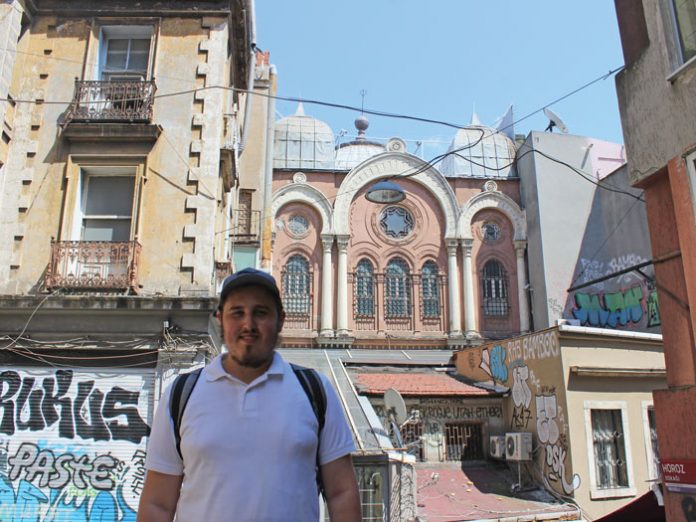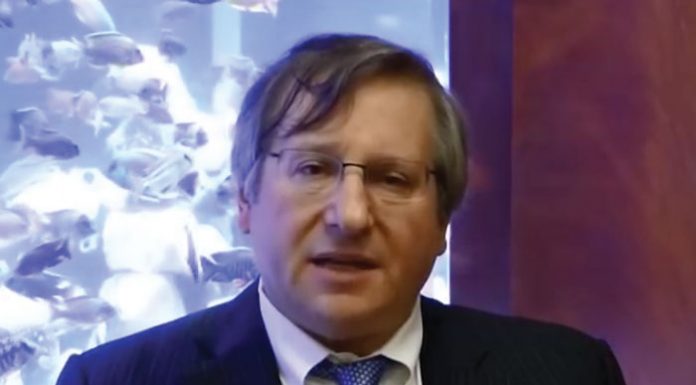My flight to Turkey touches down at Istanbul’s Ataturk Airport at 7:20 a.m. I’ve been up all night and I’m seriously exhausted, but I won’t be sleeping anytime soon. While I’ve been to Turkey many times in the past, this trip is different from all my previous ones. I have come to learn about the Jewish community in this country and how it is faring in a land that is growing increasingly more radical with each passing day, unlike my usual short touristic stopovers.
After purchasing my visa upon arrival ($30 in cash, no forms to fill out and no questions asked) I head towards passport control. The line is very long but it’s moving quickly. Within a short time I’m standing at the baggage carousel, waiting for my luggage to appear. It is then that I notice something very interesting: the baggage from my flight, which originated in Tel Aviv, is arriving on the same carousel as the baggage from another flight, this one from Islamabad, Pakistan. This pretty much sums up Turkey’s place in the world: a bridge between East and West. This is not only a metaphor but true in the literal sense as well. Most of Turkey is geographically located on the Asian continent, while a smaller area lies in Europe. In fact, the city of Istanbul itself straddles both Asia and Europe, divided by the Bosporus Strait and connected by numerous bridges, making Istanbul a truly intercontinental city. Turkey also shares borders with a wide array of countries with significant ideological differences, including Armenia, Azerbaijan, Bulgaria, Georgia, Greece, Iran and Iraq.
After locating my luggage I make my way to the arrivals area, where I scan the faces of people waiting for their loved ones, looking for my point man. After a moment I spot him, his tall frame towering above the crowd. His name is Avraham Lipovetzky, a Karaite Jew of Crimean descent [Note: Karaites are not halachically Jewish and reject Torah shebe’al peh] who works as a banker in Istanbul. I wend my way through the crowd until I am standing directly in front of him and we embrace. I’ve known Avraham for a while now, and it’s always great to see him in person. He’s wearing a T-shirt protesting the Russia’s annexation of Crimea, an issue about which he is very passionate, but we’ll save the politics for another time. Avraham has gotten permission to take two days off from work to show me around his hometown. When I ask him why he would do me such a huge favor, his three-word response is both simple and astounding: “mitzvat ahavat Yisrael,” he explains.
Avraham insists on taking my bags and is surprised that I’m dressed openly as a Jew, with my yarmulke, peiyos and tzitzis displayed proudly for all to see. “You might want to cover up a little bit,” he says, worried about the current climate for Jews in Turkey. He probably knows something that I don’t. It takes less than five minutes for Avraham to be proven right. As we step onto the train leading from the airport to the city we hear our first anti-Semitic remark, in Turkish. Avraham is quick to respond with a sharply worded comment directed at the aggressor. Although I have no idea what either of the two said, judging by the look on the Turk’s face, it is clear that Avraham doesn’t mince words. “Well, I see that you’re not afraid of anyone,” I offer after the train begins to move. “Our Torah is full of brave people,” he says, brushing it off.
We get off the train near Taksim Square, which is in the center of Istanbul on the European side of the city. It is alive with tourists, and a major transportation hub for the dozens of trains and bus lines connecting the city. Hotels, shops and restaurants are abundant in this part of town, and in the center of the square there is a large monument surrounded by water fountains. The Republic Monument, as it is known locally, is a tall arch, surrounded by numerous statues and engravings. Designed by Italian sculptor Pietro Canonica and completed in 1928, it symbolizes the Turkey of the past and the Turkey of the future. Its northern side depicts Mustafa Kemal Atatürk, the founder of the modern Turkish Republic, along with his men in full military uniform during the Turkish War of Independence, while the southern side shows them dressed in modern Western clothing—the former symbolizing his role as military commander-in-chief and the latter symbolizing his role as statesman.
Overshadowing the monument is the shell of a huge mosque that is in the process of being built, something that worries many as a sign that the pendulum is swinging eastward.
Since President Erdogan’s ascension to power, Turkey’s formerly strong relationship with the West has become strained, as he has traded allies like the United States and Russia for Iran and other baddies, and the country that was once quite warm to Israel is now one of Israel’s biggest critics. After the 2009 Mavi Marmara incident, which resulted in the deaths of ten Turkish citizens, the relationship got even worse. Israel has since apologized and paid millions of dollars in restitution to the families of those killed in an effort to placate the Turks, but President Erdogan is having none of it and continues to bash Israel whenever he can. Turkish Jews are stuck somewhere in the middle of all this madness, and although they are keeping their heads low, they are starting to wonder if they have a future in Turkey. That is why I have come here, to learn about the past and their prospects for their future.





















